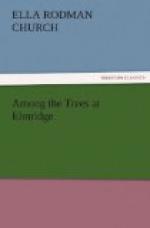“’And Judah and Israel dwelt safely, every man under his vine and under his fig tree, from Dan even to Beersheba, all the days of Solomon.’—That’s what it means, then!” said Malcolm, when he had finished reading the verse. “I’ve heard people say, ’Under your own vine and fig tree,’ and I couldn’t tell what they meant.”
“Yes,” replied his governess, “some persons make very free with the words of Holy Scripture and twist them to suit meanings for which they were not intended. Having a house of one’s own is usually meant by this quotation, and almost the same words are repeated in other parts of the Old Testament. The fig is often mentioned in the Bible, and two kinds are spoken of—the very early fig, and the one that ripens late in the summer. The early fig was considered the best; and I think that Clara will tell us what is said of it by the prophet Jeremiah.”
Clara read slowly:
“’One basket had very good figs, even like the figs that are first ripe; and the other basket had very naughty figs, which could not be eaten, they were so bad[16].’”
[16] Jer. xxiv. 2.
“But can figs be naughty, Miss Harson?” asked Edith, with very wide-open eyes. “I thought that only children were naughty,”
“There are ‘naughty’ grown people as well as naughty children,” was the reply, “and inanimate things like figs in old times were called naughty too, in the sense of being bad.—The fruit of the fig tree appears not only before the leaves, but without any sign of blossoms, the flowers being small and hidden in the little buttons which first shoot out from the points of the sterns, and around which the outer and firm part of the fig grows. The leaves come out so late in the season that our Saviour said, ’Now learn a parable of the fig tree; when his branch is yet tender, and putteth forth leaves, ye know that summer is nigh[17].’ Did not our Lord say something else about a fig tree?”
[17] Matt. xxiv. 32.
“Yes,” replied Clara; “the one that was withered away because it had no figs on it.”
“The barren fig tree which was withered at our Saviour’s word, as an awful warning to unfruitful professors of religion, seems to have spent itself in leaves. It stood by the wayside, free to all, and, as the time for stripping the trees of their fruit had not come—for in Mark we are told that ’the time of figs was not yet[18]’—it was reasonable to expect to find it covered with figs in various stages of growth. Yet there was ‘nothing thereon, but leaves only.’ Find the nineteenth verse of the twenty-first chapter of Matthew, Malcolm, and read what is said there.”
[18] Mark xi. 13.
“’And when he saw a fig tree in the way, he came to it, and found nothing thereon, but leaves only, and said unto it, Let no fruit grow on thee henceforward for ever. And presently the fig tree withered away.’”




